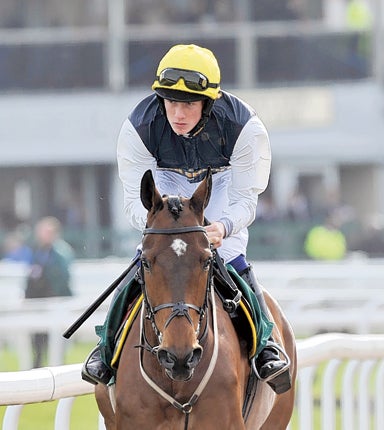Twiston-Davies out of shadows as son rises
Trainer who refused interviews after winning the National tells Chris McGrath how 17-year-old Sam looks on Hello Bud

After all this time, it remains difficult to know quite what to make of Nigel Twiston-Davies.
He has won the National twice already, but betrayed little obvious satisfaction on either occasion. With Earth Summit, in 1998, he notoriously declined to share the experience with millions at home. Four years later, with Bindaree, he did not know whether to laugh or cry, having persuaded himself beforehand that he would quit training.
But he returns today, with no fewer than five runners, his reputation in the sport higher than ever. And perhaps this time he might even achieve a victory of another kind, in a rapport with the public beyond.
That process would be assisted by the freckled schoolboy seeking to become the youngest National winner since Bruce Hobbs on Battleship in 1938, also aged just 17. For any parent will discover an emotional affinity when Twiston-Davies hoists his son, Sam, into the saddle on Hello Bud.
Though his own amateur career was relatively undistinguished, for now Nigel retains bragging rights over these fences, having finished fourth in the Foxhunters' Chase in 1981. On Thursday, in contrast, Sam took a heavy fall from Baby Run. But it was his performance on the same horse, in the divisional championship at Cheltenham last month, that had confirmed his eligibility for this stage.
That was the crowning afternoon of Nigel's career. He watched Sam's race in the press conference marquee, while still taking questions about the success of Imperial Commander in the Cheltenham Gold Cup itself. With the boy safely out of earshot, there were none of the usual, feet-on-the-ground reprimands – just pride and, as Sam kicked clear, infectious excitement.
Seated together at their Cotswold stables, Nigel tempers his testimony. "Sam does a very good job," he says. "The worry side's gone, he can look after himself. He's ridden some pretty hairy novices and got them round, so I'm quite confident in him. Pony racing sorts these boys out, teaches them how to hit the starts right, how to ride finishes, how to look tight."
But when the boy sets off to Wetherby in his miniature white van – having only passed his driving test in January – Nigel no longer dissembles. "Straight away he was very good," he admits. "See him over a fence, he does have amazing balance."
News later arrives that Sam has ridden his 16th winner, rendering superfluous the special dispensation sought (and gained) for him to ride in the National. He is keeping his nose clean at school, and his teachers are being flexible in return, but will turn professional as soon as he has completed his A levels. After Cheltenham, meanwhile, even pretty girls at school are showing an interest – "and not just the ugly ones".
Little wonder if his younger brother, Willie, has already identified the first amateur chase for which he will be eligible when turning 16. "At their age, it was all I wanted to do, as well," Nigel says. "But I got too heavy, and after that all I wanted to do was farm. When that went wrong, financially, we switched to this – the [private training] permit had been going well, and you could do more with fewer acres."
Earth Summit seemed to vindicate that decision, but by the time he returned with Bindaree he had "a bigger debt than Argentina" and was hankering for a Welsh smallholding. "Lots of trainers say they couldn't do anything else," he still says. "But to me there's an awful lot you might do. As things turned out, though, I'm very glad I decided to carry on. A couple of my owners were very persuasive. I had to find an awful lot of money, but they got me organised in my own mind. And I didn't want to see someone else training Bindaree. I'd probably have been very happy somewhere else, but you get so much pleasure from family, and I'd like to keep it going for the boys now."
He only ever sought to keep his dignity, not his distance. Even the infamous rebuttal of Des Lynam in 1998, he protests, was a misunderstood self-parody. "It was meant to be a joke. But he took it seriously, and buggered off. Everyone says, quite rightly, that if it helps the sport we all love, then we've got to do it. The only reason I didn't do interviews, before, is that so many people come across as prats, and I thought I might do the same."
Even now, at 52, he remains studiously guarded. "I don't enjoy it at all when there's too much fuss going on," he admits. "I much prefer the small winners, or the ones you don't expect."
Few pundits expect much of his runners today. Some are dodgy jumpers, they reckon, and others look on the wane. But he regards that as their problem, not his. He brings due fatalism to a calling that complicates both triumph and disaster. Bindaree's success left him bewildered, not ecstatic. Conversely, his despair, on the blackest days of all, is not nourished by doubt.
"I've seen more horses than I'd like break a leg," he says. "But if anything does happen, they're not in any pain – the adrenalin has kicked in – and, of course, they don't know what is about to happen. It's just the people who have cared for them, the people left behind, they're the ones who know, who are devastated. It's the same as if one of us drops dead. We don't know about it, it's those we leave behind who are miserable." He brightens, gives an enigmatic chuckle. "I'd be very happy if this roof caved in. That way I wouldn't get fatter, uglier, older."
Join our commenting forum
Join thought-provoking conversations, follow other Independent readers and see their replies
Comments